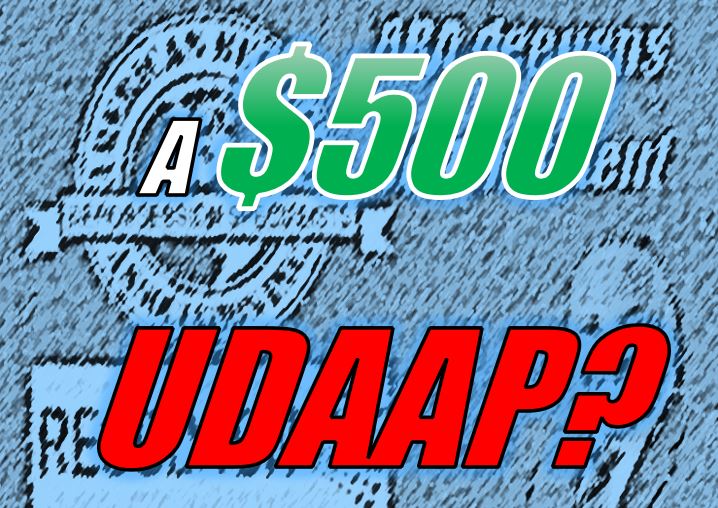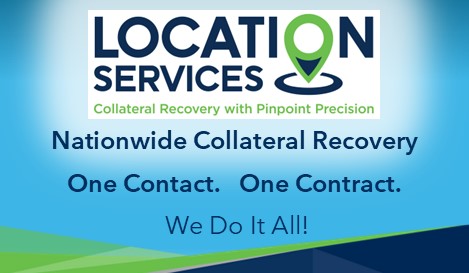
“bonuses or employment status to unrealistic sales goals or to the terms of transactions may intentionally or unintentionally encourage illegal practices” – CFPB Bulletin dated NOV 28, 2016
GUEST EDITORIAL
Well let me see if I fully understand this new Wells Fargo Incentive Program. To quote from an article published by ARA President, Vaughn Clemmons, “This past week, Scott Darling shared news about an initiative that Wells Fargo presented to all of their nationwide forwarding vendors last week. This was the very first time we were introduced to the program.
For ALL assignments (vol, Invol, impound) placed between August 15 and November 15, Wells Fargo is offering an additional $500 per recovery in 44 states plus DC. This fee does not include the $40 fuel surcharge currently in place, mileage needed, and/or flatbed if requested. Excluded States: Arizona, California, Idaho, Nevada, Oregon, Utah, Washington”
So, if a consumer calls up Wells Fargo and offers to voluntarily surrender a mortgaged vehicle, Wells Fargo will pay the recovery agent their normal voluntary Repossession Fee ($125.00-$275.00) plus an additional $500.00 to recover that vehicle, totaling $625.00 to $775.00.
If it is an involuntary repossession and the normal fee would be between $325.00 to $475.00 plus the $500.00 bonus means Wells Fargo is paying a fee totaling $825.00 to $975.00.
I would question where this $500.00 is coming from and who will ultimately pay it.
Why suddenly can Wells Fargo afford to pay the repossessor tantamount to more than double what they have been paying for a repossession? If they can pay this amount now, why could they not pay it in the past? Has Wells Fargo finally realized the truth in what I have heard Eagle Group leader Ron Brown say for many years, “If you pay peanuts, you get monkeys”? Is Wells Fargo tired of hiring monkeys?
The most crucial question I query is who is paying the $500.00. Normally, all repossession charges are passed on to the consumer in the creation of a deficiency balance which allows the lender to collect it from the consumer or charge it off as a loss.
I can clearly understand how field agents would ignore lower paying clients and give Wells Fargo assignments priority. I also know that the agents might take extra risks and put out an extra effort to secure Wells Fargo vehicles. $500.00 is a lot of money in today’s inflationary environment.
In the case of the voluntary surrender and the involuntary recovery the consumer is being forced to pay $500.00 more than what the actual charges would have and should have normally been.
If this charge is being passed on to the consumer, I would be surprised if the CFPB did not view this action as a UDAAP violation.
To quote from a CFPB Bulletin dated NOV 28, 2016;
WASHINGTON, D.C. – The Consumer Financial Protection Bureau (CFPB) issued a bulletin today warning supervised financial companies that creating incentives for employees and service providers to meet sales and other business goals can lead to consumer harm if not properly managed. Tying bonuses or employment status to unrealistic sales goals or to the terms of transactions may intentionally or unintentionally encourage illegal practices such as unauthorized account openings, unauthorized opt-ins to overdraft services, deceptive sales tactics, and steering consumers into less favorable products. The CFPB bulletin outlines various steps that institutions can and should take to detect, prevent, and correct such production incentives so that they do not lead to abuse of consumers.
“Tying bonuses and job security to business goals that are unrealistic or not properly monitored can lead to illegal practices like unauthorized account openings and deceptive sales tactics,” said CFPB Director Richard Cordray. “The CFPB is warning companies to make sure that their incentives operate to reward quality customer service, not fraud and abuse.”
Banks and other financial companies use incentives to encourage their employees and service providers to accomplish business objectives. Incentives can range from financial bonuses and other monetary compensation to benchmarks that affect whether an employee or service provider will remain employed or retained at all. These programs commonly reward employees or services providers for selling or referring new products or services to existing customers, signing up new customers, selling products and services at higher prices, or meeting target amounts for debt collections.
Although they are not unique to the financial sector, these incentives are used in many consumers financial markets, such as credit cards, mortgages, checking accounts, and debt collection. Reasonable incentives that are properly overseen can benefit consumers and enhance an institution’s overall performance. Consumers may receive improved customer service or companies may be able to attract and retain more high-performing employees. However, incentives that are not carefully managed may encourage and reward behaviors by employees and service providers that harm consumers. “
I think this offer by Wells Fargo to pay a fair wage is great, but I feel it should be allocated as a wage increase rather than an incentive bonus and all involved should remember that old saying, “It is easy to give, quite harder to take back”.
Respectfully Submitted,
Hotel Charlie Alpha










Facebook Comments